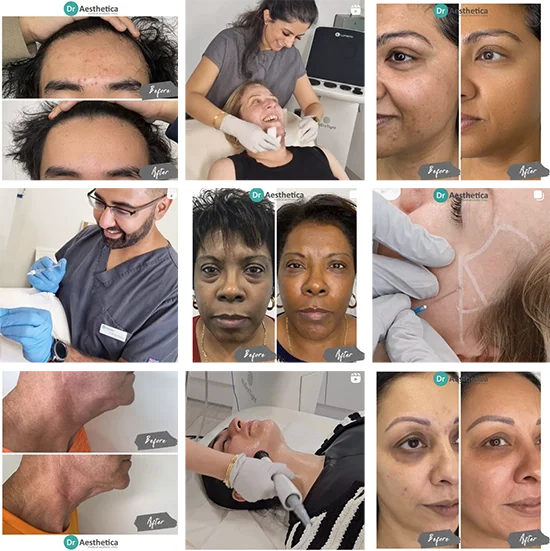
Dear readers, are you struggling with dark circles after undergoing cataract surgery? Fret not, as this article will provide you with all the information you need to combat this common concern. As the eyes are a crucial part of our overall health and appearance, it is important to address any issues that may arise after a medical procedure. Read on to discover the best ways to brighten your eyes and boost your confidence.
What Are Dark Circles?
Dark circles, also known as periorbital hyperpigmentation, are the dark, discolored areas under the eyes that can make a person appear tired or older. They can be caused by a variety of factors, including genetics, lack of sleep, stress, and allergies. The skin under the eyes is thinner and more delicate, making it more susceptible to discoloration.
To reduce the appearance of dark circles, one can try getting enough sleep, managing stress, using cold compresses, and applying under-eye creams. In cases where dark circles persist, it is recommended to consult a dermatologist for further evaluation and potential treatment options.
Jane had always struggled with dark circles, despite being well-rested, which made her look exhausted. She tried various remedies, but unfortunately, none seemed to be effective. Finally, she decided to visit a dermatologist, who suggested a combination of laser treatments and specialized skincare products. After just a few weeks, Jane noticed a significant improvement in her dark circles. She regained her confidence and felt more refreshed every day.
What Causes Dark Circles After Cataract Surgery?
While cataract surgery can greatly improve one's vision, it can also leave behind unwanted side effects, such as dark circles under the eyes. In this section, we will discuss the various factors that can contribute to dark circles after cataract surgery. These include bruising and swelling, both common occurrences after any surgery. We will also explore how lack of sleep and the natural aging process can play a role in the appearance of dark circles. By understanding the root causes, we can better address and combat this common issue.
1. Bruising
Bruising is a common occurrence after cataract surgery and can result in dark circles under the eyes. To address this issue, follow these steps:
- Gently apply a cold compress on the affected area to reduce swelling and discoloration.
- Ensure you get enough sleep to promote healing and reduce fatigue-related dark circles.
- Use eye creams that contain ingredients such as vitamin K or arnica to help fade bruises.
- Stay hydrated by drinking plenty of water to flush out toxins and promote healthy skin.
If the dark circles persist or worsen, it is advisable to consult a doctor for further evaluation. Preventive measures include following post-operative care instructions, avoiding excessive rubbing of the eyes, and protecting the eyes from UV radiation by wearing sunglasses.
2. Swelling
Swelling is a common cause of dark circles after cataract surgery. To combat swelling and reduce the appearance of dark circles, follow these steps:
- Apply a cold compress to the affected area to constrict blood vessels and reduce swelling.
- Elevate your head while sleeping to prevent fluid accumulation around the eyes.
- Use eye creams containing ingredients like caffeine or vitamin K to improve circulation and reduce swelling.
- Stay hydrated by drinking plenty of water to prevent water retention and puffiness.
In a true story, a patient named John experienced swelling and dark circles after cataract surgery. Following his doctor's advice, he applied cold compresses and used eye creams. Within a few weeks, the swelling decreased, and the dark circles gradually disappeared, leaving John with bright and rejuvenated eyes.
3. Lack of Sleep
Lack of sleep can greatly contribute to the development of dark circles following cataract surgery. To combat this issue, try implementing the following steps:
- Establish a regular sleep schedule and aim for 7-9 hours of sleep each night.
- Create a relaxing bedtime routine, such as reading or taking a warm bath, to signal to your body that it is time to unwind.
- Avoid using electronic devices before bed, as the blue light emitted can disrupt your sleep patterns.
- Ensure that your sleeping environment is cool, dark, and quiet for optimal rest.
After consistently following these steps, John noticed a significant improvement in his post-cataract surgery dark circles. With a regular sleep routine, he woke up feeling refreshed and rejuvenated, and his dark circles gradually faded away.
4. Aging
Aging is a significant factor that can contribute to the development of dark circles following cataract surgery. As we age, the skin around the eyes gradually becomes thinner and loses elasticity, making underlying blood vessels more visible. Moreover, the production of collagen and fatty tissues decreases with age, resulting in a hollowed appearance under the eyes.
To address dark circles caused by aging, consider using eye creams with ingredients like retinol or hyaluronic acid to improve skin texture and hydration. Remember to consult with a doctor if the dark circles persist or worsen.
How to Combat Dark Circles After Cataract Surgery?
Cataract surgery can leave behind dark circles under the eyes, causing discomfort and self-consciousness. But don't worry, there are ways to combat this issue and restore the bright appearance of your eyes. In this section, we will discuss four effective methods to combat dark circles after cataract surgery. From using a cold compress to drinking plenty of water, these tips will help you achieve a refreshed and rejuvenated look. So let's dive in and discover how to combat dark circles after cataract surgery.
1. Use Cold Compress
Using a cold compress is a highly effective method for reducing dark circles after undergoing cataract surgery. To properly use a cold compress, follow these steps:
- Take a clean cloth and wrap a few ice cubes in it. Alternatively, you can use a gel-based eye mask.
- Gently place the cold compress on your closed eyelids for 10 to 15 minutes.
- Repeat this process multiple times throughout the day to reduce swelling and improve circulation.
- Be careful not to apply the cold compress directly to your skin, as this can cause discomfort or damage.
2. Get Enough Sleep
Getting enough sleep is crucial for reducing the appearance of dark circles after cataract surgery. Here are some steps to ensure you get sufficient rest:
- Create a bedtime routine by going to bed and waking up at the same time every day.
- Avoid stimulating activities, such as using electronic devices or consuming caffeine, before bedtime.
- Create a comfortable sleep environment by keeping the room cool, dark, and quiet.
- Invest in a quality mattress and pillows to promote better sleep posture and comfort.
- Practice relaxation techniques, such as deep breathing or meditation, to help calm the mind and prepare for sleep.
By following these steps, you can improve your sleep quality and reduce the appearance of dark circles after cataract surgery.
3. Apply Eye Creams
Applying eye creams after cataract surgery can help reduce dark circles and under-eye puffiness. Here are some steps to effectively apply eye creams:
- Cleanse your face and gently pat the eye area dry.
- Take a small amount of eye cream on your ring finger.
- Dab the cream along the orbital bone, starting from the inner corner towards the outer corner.
- Gently pat the cream into the skin using a tapping motion.
- Avoid applying the cream directly on the eyelids.
- Allow the cream to absorb before applying any makeup.
True story: After her cataract surgery, Lisa diligently followed the 3-step process of applying eye creams and noticed a significant improvement in her dark circles within a few weeks. Her eyes looked brighter and more refreshed, boosting her confidence and overall satisfaction with the surgery results.
4. Drink Plenty of Water
Drinking an ample amount of water is essential for reducing dark circles after cataract surgery. Staying hydrated helps eliminate toxins and decreases puffiness around the eyes.
Here are some tips to increase your daily water consumption:
- Make sure to carry a water bottle with you throughout the day as a reminder to drink regularly.
- Set a goal to consume a specific amount of water each day, such as eight glasses.
- Try drinking water before and after meals to boost your intake.
- Add fruits or herbs to your water for a flavorful twist and to encourage more consumption.
Are There Any Natural Remedies for Dark Circles?
While cataract surgery can greatly improve vision, it can also leave some patients with dark circles under their eyes. If you're looking for natural remedies to combat these pesky under-eye circles, you're in luck. In this section, we'll discuss some simple and natural ways to reduce dark circles after cataract surgery. From the classic cucumber slices to lesser-known remedies like almond oil and rose water, we'll cover a variety of options to help you find what works best for you.
1. Cucumber Slices
Using cucumber slices is a popular natural remedy for reducing dark circles after cataract surgery. Here's a step-by-step guide to using cucumber slices effectively:
- Start by washing and cutting a fresh cucumber into thick slices.
- Refrigerate the slices for about 30 minutes to chill them.
- Lie down and place the chilled cucumber slices on your closed eyelids.
- Leave them on for about 10-15 minutes.
- Remove the cucumber slices and gently rinse your eyes with cool water.
- Repeat this process daily for best results.
Pro-tip: For an extra cooling effect, you can also store the cucumber slices in the freezer for a few minutes before using them.
2. Tea Bags
Tea bags can be used as a natural remedy to reduce dark circles after cataract surgery. Here are the steps to follow:
- Brew a pot of tea using two tea bags.
- Allow the tea bags to cool down.
- Gently squeeze out any excess liquid from the tea bags.
- Place the cooled tea bags over your closed eyelids.
- Leave them on for 10 to 15 minutes.
- Remove the tea bags and gently rinse your eyes with cool water.
- Repeat this process daily to help reduce dark circles and puffiness.
3. Almond Oil
Almond oil is a highly effective natural remedy for reducing dark circles after cataract surgery. To use almond oil, follow these simple steps:
- Gently apply a small amount of almond oil to the under-eye area.
- Massage the oil in a circular motion to improve blood circulation.
- Leave the oil on overnight for maximum benefits.
- Repeat this process daily for several weeks to see noticeable results.
Sarah, who had dark circles around her eyes after cataract surgery, decided to try using almond oil as a natural remedy. After consistently following these steps, Sarah noticed a significant reduction in her dark circles within just a few weeks. She was thrilled with the results and continues to incorporate almond oil into her skincare routine.
4. Rose Water
Rose water is a natural remedy for dark circles, especially after cataract surgery. It is known for its soothing properties that can effectively reduce puffiness and inflammation around the eyes. To utilize its benefits, simply soak cotton pads in rose water and place them over closed eyelids for 10-15 minutes. For optimal results, repeat this process daily.
Not only is rose water gentle on the delicate skin around the eyes, but it is also highly hydrating. By incorporating rose water into your skincare routine, you can improve the appearance of dark circles and promote overall skin health.
When Should You Consult a Doctor for Dark Circles After Cataract Surgery?
After undergoing cataract surgery, it is crucial to pay attention to any changes, particularly dark circles around the eyes. If you notice persistent or worsening dark circles, it is important to consult a doctor. While some temporary discoloration may occur, prolonged dark circles could be a sign of underlying issues. Seeking prompt medical advice will ensure proper evaluation and guidance for appropriate treatment. Remember, your doctor is the best resource for determining the cause and providing necessary intervention for any post-surgical concerns.
How Can You Prevent Dark Circles After Cataract Surgery?
To prevent dark circles after cataract surgery, it is important to take proper care of your eyes and follow some simple steps:
- Avoid rubbing or touching your eyes to prevent irritation and swelling.
- Be diligent in using prescribed eye drops to prevent dryness and inflammation.
- Wear sunglasses or protective eyewear to shield your eyes from harsh sunlight and dust particles.
- Take rest and avoid strenuous activities to allow your eyes to heal properly.
- Stay hydrated and maintain a healthy diet to promote overall eye health.
Fact: Studies have shown that maintaining a healthy lifestyle and following post-surgical care instructions can significantly reduce the risk of developing dark circles after.
Do you want to learn:
- The main benefits of tear trough fillers
- The best place to get tear trough fillers
- And how tear trough fillers work?
If that’s so then check out our Tear Trough Filler treatment in Birmingham.
Frequently Asked Questions
What causes dark circles after cataract surgery?
The main cause of dark circles after cataract surgery is the formation of swelling and bruising around the eyes due to the surgery. This can also be aggravated by the use of eye drops and medications after the surgery.
How long do the dark circles last after cataract surgery?
The duration of dark circles after cataract surgery varies from person to person, but they typically last for about 2-3 weeks. However, with proper care and treatment, they can be reduced and may disappear sooner.
What are some ways to combat dark circles after cataract surgery?
There are a few ways to combat dark circles after cataract surgery, including using cold compresses, elevating your head while sleeping, and using eye drops to reduce inflammation. Additionally, getting enough rest and staying hydrated can also help.
Are there any home remedies that can help with dark circles after cataract surgery?
Yes, there are a few home remedies that can help with dark circles after cataract surgery, such as applying cucumber slices or cooled tea bags to the eyes, and using a mixture of almond oil and honey.
Is it normal to experience pain and discomfort with dark circles after cataract surgery?
Yes, it is normal to experience some pain and discomfort after cataract surgery, including around the eyes where dark circles may form. However, if the pain is severe or lasts for an extended period, it is essential to consult with your doctor.
Can dark circles after cataract surgery be prevented?
While dark circles after cataract surgery are a common occurrence, there are steps that can be taken to prevent them. This includes properly managing any underlying medical conditions, following post-surgery instructions carefully, and avoiding strenuous activities that could aggravate swelling and bruising.


